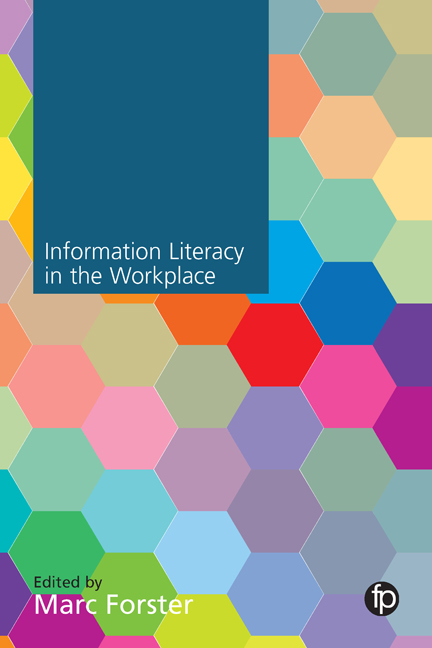Book contents
- Frontmatter
- Contents
- Figures and tables
- Contributors
- Foreword
- 1 Information Literacy and the workplace: new concepts, new perspectives?
- 2 How is Information Literacy experienced in the workplace?
- 3 Information Literacy and the personal dimension: team players, empowered clients and career development
- 4 From transaction to transformation: organizational learning and knowledge creation experience within Informed Systems
- 5 Virtuality at work: an enabler of professional Information Literacy
- 6 Determining the value of Information Literacy for employers
- 7 Information Literacy's role in workplace competence, ‘best practice’ and the ethics of professional obligation
- 8 Learning within for beyond: exploring a workplace Information Literacy design
- 9 Developing information professional competences in disciplinary domains: a challenge for higher education
- 10 The ‘hidden’ value of Information Literacy in the workplace context: how to unlock and create value
- 11 The ‘Workplace Experience Framework’ and evidence-based Information Literacy education
- References
- Index
6 - Determining the value of Information Literacy for employers
Published online by Cambridge University Press: 08 June 2018
- Frontmatter
- Contents
- Figures and tables
- Contributors
- Foreword
- 1 Information Literacy and the workplace: new concepts, new perspectives?
- 2 How is Information Literacy experienced in the workplace?
- 3 Information Literacy and the personal dimension: team players, empowered clients and career development
- 4 From transaction to transformation: organizational learning and knowledge creation experience within Informed Systems
- 5 Virtuality at work: an enabler of professional Information Literacy
- 6 Determining the value of Information Literacy for employers
- 7 Information Literacy's role in workplace competence, ‘best practice’ and the ethics of professional obligation
- 8 Learning within for beyond: exploring a workplace Information Literacy design
- 9 Developing information professional competences in disciplinary domains: a challenge for higher education
- 10 The ‘hidden’ value of Information Literacy in the workplace context: how to unlock and create value
- 11 The ‘Workplace Experience Framework’ and evidence-based Information Literacy education
- References
- Index
Summary
This chapter will discuss:
• how the value of Information Literacy in the workplace might be increased by employing and training individuals who have appropriate and relevant know-how, competency and awareness in the handling of information, in whatever form that takes.
• how that value might also be increased by deploying processes and creating environments that help to foster effective uses of data and information.
Introduction
This chapter discusses the value of Information Literacy (IL) in the workplace. It draws from the conclusions of a study that considered, in the setting of a small range of enterprises, the value that is added by employing and training individuals who have appropriate and relevant know-how, competency and awareness in the handling of information, in whatever form that takes; and in deploying processes and creating environments that help to foster effective uses of data and information. The value might be financial, but it might also relate to other factors that are important to enterprises, such as enhanced efficiency, competitive advantage or employee job satisfaction. These questions bear a close relation to the long-standing debate about the impact of IL instruction in school and higher education settings (Todd, 1995; Streatfield and Markless, 2008); we can similarly ask whether and how information know-how contributes to the well-being of enterprises.
The chapter introduces a practical approach to addressing these questions, and should therefore be relevant to enterprises across all sectors (commercial, public and not-for-profit), and particularly to those within enterprises with responsibility for human resources, training and skills, information/data management and financial management. It is also relevant for information professionals (particularly those in the workplace), information scientists and all those with an interest in the contribution of information, data and knowledge to the workings of enterprises.
Background
Recent literature reviews by Williams, Cooper and Wavell (2014) and Inskip (2014) have discussed the importance of IL in the workplace. The reviews counter the bias in the IL literature towards perceiving it narrowly as information-searching competencies of the kind that are deployed in higher education settings (Whitworth, 2014, 74–81). IL can be generally defined as the capacity to make critical judgements about information, and this capacity can be learned. Workplace learning, however, is less structured and more collaborative than most formalized educational settings.
- Type
- Chapter
- Information
- Information Literacy in the Workplace , pp. 67 - 84Publisher: FacetPrint publication year: 2017
- 3
- Cited by



